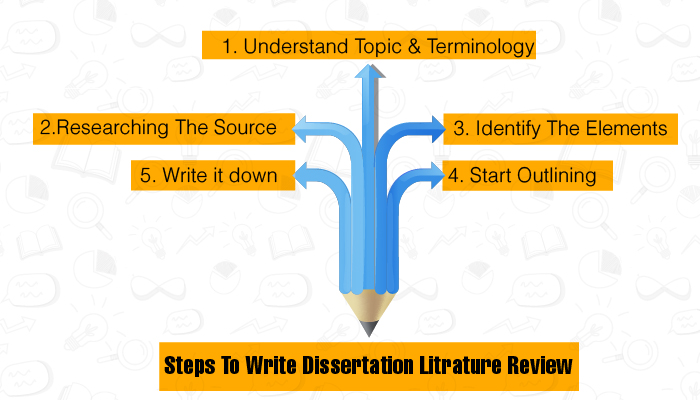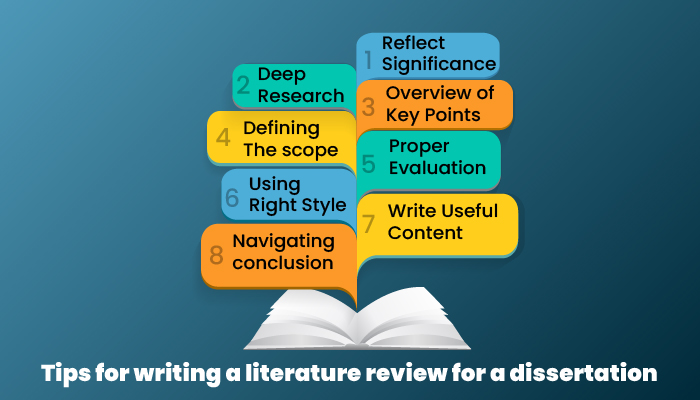
The literature review is one of the essential chapters in your dissertation proposal. The literature reviews in your dissertation, thesis, or research project are where you synthesize previous work and lay the theoretical groundwork for your research. Understanding the current state of knowledge, paying close attention to the research conducted, and reading theories connected to your subjects are essential elements of writing a literature review for a dissertation.
A literature review is a key part of your academic career because it shows your tutor or reader that you have a thorough understanding of the sources relevant to your research topic or question. The literature review should be sorted logically and divided into several sections if the dissertation is lengthy. However, the critique is done in a structured manner. Before you write a literature review for a dissertation, your supervisor will often expect to see a preliminary search strategy. But first, let’s have a close look at what is literature review:
What is Literature Review?
A dissertation literature review allows you to identify relevant theories, methods, and gaps in existing research by critically evaluating the sources you have gathered about your topic. It is a comprehensive summary of the previous research conducted on a topic. The literature review allows you to demonstrate how your research contributes to a debate while developing a theoretical framework and research methodology for your study.
Everyone wants to write an excellent literature review for their dissertation, but they don’t know how. It’s no surprise that’s why we’re here, right? Here are the steps to writing the perfect dissertation literature review:
Steps for writing a literature review for a dissertation

Understand the topic & relevant terminologies
Before researching the relevant literature, you need to have a determined topic. If you are writing a dissertation or research paper, you will look for literature suitable to your research problem and questions. You can start by listing the keywords related to your research topic. Include a list of synonyms and related terms for each concept you’re interested in. You can add to this list as you come across new keywords during your literature search. Ensure to read in detail to know if the article is suitable for your question.
Research, evaluate and finalize the sources
You probably won’t be able to read every single line of the selected source paper. The solution to this is to evaluate the sources which are relevant to your research query. Ask yourself every time you read an article what question is the author addressing here, what are the theories, models, and methods, and what are the results and conclusions of the body. Make sure your sources are credible, and that you read any landmark studies and major theories in your field of study. Take notes to make a draft that you can later add to your literature review. Understanding the given thesis’s importance, applications, and advantages from the researcher’s perspective.
Consider & Identify gaps, themes, and debates
Before you begin organizing the argument and structure of your literature review, make sure you understand the connections and relationships between the sources you’ve read. Search for where the sources disagree, what is missing from the literature, and what questions and concepts occur in the literature. This step will assist you in determining the structure of your literature review for a dissertation.
Start the outlining process
To outline the body of your literature review, you can opt for various approaches such as chronological, thematic, methodological, and hypothetical approaches.
The simplest approach is to trace the evolution of the topic over time using a chronological approach. The only concern while writing in this order is to not include listing and summarizing the sources in order. Examine the patterns, watershed moments, and key debates that have shaped the field’s trajectory.
If there are some recurring central themes, your literature can include subsections that address various aspects of the topic. This is what is included in the Thematic approach. Suppose you are writing about the revolt of the past, then you may include critical themes such as change of law, strikes, and the condition of the nation.
The methodological section deals with various disciplines or fields that employ various research methods. In the methodological method, you have to compare the result and conclusions derived from other research methods to write a literature review for a dissertation.
A literature review is frequently used to lay the groundwork for a theoretical framework. It can be used to talk about different hypotheses, models, and subjective definitions. A specific hypothetical approach or combining various theoretical concepts may be useful in developing a framework for your research.
Write Your Literature Review
Like every other academic essay, the literature review for a dissertation consists of an introduction, the main body, and a conclusion.
Introduction
The introduction should lay the groundwork for your writing’s topic and purpose. It should include a context for reviewing the literature. The introduction should be interesting to keep the readers’ attention.
Main Body
The main body provides information about the relationship between your chosen topic and the larger subject area. It depends on the length of your review and whether your main body divides into subsections. It should categorize the literature based on common themes.
Conclusion
The conclusion summarises the concepts of the literature review for a dissertation. It identifies the existing gaps in the research topic. Make sure to demonstrate how your research fills gaps and adds attributes, or how you used extant methods and theories to establish a structure for your research.
Tips for writing a literature review for a dissertation

- Show the Significance of the topic
You can’t just re-mention the short description of each source, You also need to show its importance, and why did you write it in your literature review. Begin by determining the main research question or topic you want to address in your literature review. This will assist you in narrowing your search and ensuring that you are reviewing relevant literature.
- Deep Research
Conduct a thorough search of the literature. Use online databases, such as PubMed and Google Scholar, to find articles and other sources related to your topic. Be sure to use a variety of search terms and consider both primary and secondary sources.
- Overview of key points
Write a clear and concise summary of the literature. In your literature review, you should provide an overview of the key findings and conclusions of the research that you have found. Readers should understand the highlighted topics in your document so that they can understand your literature review and other sections in the context of these topics.
- Define the scope for review
It will assist you in selecting the most important works in this field that should be described. It is a useful skill to understand how large the literature review should be and which items should be included.
- Properly Evaluate the literature
Analyze and evaluate the literature. As you read through the literature, consider the quality and relevance of each source. Be sure to note any gaps or areas that are not adequately addressed in the literature.
- Use the right style
There are different styles and preferences in every university regarding literature writing. Firstly, you should read the requirements and then edit your document accordingly. It is recommended to contact your teachers or professors to get more info about the requirements.
- Write useful content
Do not repeat the entire content. Instead, consider the elements that will pique your readers’ interest, and what information will be useful, and fill it with information that the readers are looking for.
- Write a navigational conclusion
Conclude your review by synthesizing the literature and discussing the implications of your findings. Consider any limitations or future research directions that may be pertinent to your topic.
We guarantee that if you follow these tips and use the proper method to write a literature review for a dissertation, you will be praised by your professors and peers. We also provide online services for writing a dissertation literature review. Our writing experts are always available to provide you with the highest quality dissertation possible. They create original content from scratch and provide professional proofreading and editing services. What exactly are you waiting for? Finish that dissertation right away!

 + 44 20 8144 3706
+ 44 20 8144 3706